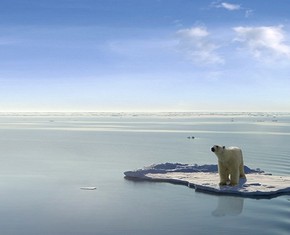The views expressed in our content reflect individual perspectives and do not represent the authoritative views of the Baha'i Faith.
So far in this short series of essays we’ve talked about love as the source of the strong force that holds every atom together. We’ve looked at the mysteries of atomic structure and explored the role the Creator plays in their creation. Now let’s expand our vision a little and consider the wider world of nature as the expression and outcome of that love:
When we look upon the world of creation from another standpoint, the analytic, we observe that everything is the result of composition of many single atoms which through the law of affiliation have adhered and according to the shape, order and positions of these atoms, a given being steps forth into the court of objectivity. Every single atom of these aggregate atoms has its myriad transferences as has been proved by science.
Every single atom has its coursings throughout all the kingdoms of life. For instance, that which has gone into the composition of a human being was at one time in the mineral kingdom. Along the degrees of the mineral kingdom it journeyed, appearing in various forms and reflecting various images, manifesting a peculiar virtue in each. In the vegetable kingdom, it again partook of many experiences and through each experience became adorned with an added attribute. Having perfected its journeyings here, it entered the animal kingdom and was incarnated throughout multitudes of animal forms and finally, in the human kingdom it traversed endless forms of humanity, in each form of composition showing forth a particular aspect of the one power.
The forms of life are infinite, therefore the transferences of this primordial unit throughout the degrees of creation are infinite.
All phenomena are involved in all phenomena. Consider what a transcendent unity exists, that, from this standpoint, every monad is the expression of all creation; this is the law and order in the world of existence. What wondrous symmetry! What stupendous organization! What divine completeness! What elysian co-ordination! What celestial union! – Abdu’l-Baha, Divine Philosophy, pp. 166-167.
 “All phenomena are involved in all phenomena,” Abdu’l-Baha wrote, summarizing the unified Baha’i view of the natural world. This organic view of nature, coupled with an awareness of God’s love as represented by the strong force in physics, can offer us a completely different way of looking at our place in nature. When we think of the atoms that make up our own bodies, and realize that they have traveled throughout the cosmos to reach their fruition in our individual existence, it humbles us, and makes us aware of the love and affinity and union God offers each human being.
“All phenomena are involved in all phenomena,” Abdu’l-Baha wrote, summarizing the unified Baha’i view of the natural world. This organic view of nature, coupled with an awareness of God’s love as represented by the strong force in physics, can offer us a completely different way of looking at our place in nature. When we think of the atoms that make up our own bodies, and realize that they have traveled throughout the cosmos to reach their fruition in our individual existence, it humbles us, and makes us aware of the love and affinity and union God offers each human being.
Western cultures, with their roots in Judeo-Christian fundamentalism, believed that man and nature were separate and adversarial, and that man’s duty involved conquering nature. Seeing nature as inherently inimical, hostile and wild, Europeans set out to tame the wilderness of the frontier.
But most indigenous peoples, whose hunter-gatherer cultures evolved within wild lands, do not view nature as their enemy. The lives of many indigenous peoples—who see themselves as part of nature– depend on a sustainable harvest of resources from the land without altering or “defeating” nature.
Rather than the antiquated Western way of understanding nature, the Baha’i perspective encourages all humanity to recognize their oneness with the natural world and act accordingly. Not only do Baha’is see humanity as one with nature, the Baha’i teachings say that all life, including the life of the soul, exhibits a transcendent unity:
…it is evident that life is the expression of composition, and mortality, or death, is equivalent to decomposition. As the spirit of man is not composed of material elements, it is not subject to decomposition and, therefore, has no death. It is self-evident that the human spirit is simple, single and not composed in order that it may come to immortality, and it is a philosophical axiom that the individual or indivisible atom is indestructible. At most, it passes through a process of construction and reconstruction. For example, these individual atoms are brought together in a composition, and through this composition a given organism — such as a man, an animal or a plant — is created. When this composition is decomposed, that created organism is brought to an end, but the component atoms are not annihilated; they continue to exist because they are single, individual and not composed. Therefore, it may be said that these individual atoms are eternal. Likewise, the human spirit, inasmuch as it is not composed of individual elements or atoms — as it is sanctified above these elements — is eternal. This is a self-evident proof of its immortality. – Abdu’l-Baha, The Promulgation of Universal Peace, p. 306.
This unity, based on the recognition of creation as an ongoing act of love from the Creator, asks each of us to recognize our inmost essence and view it as our supreme gift.
















Comments
Sign in or create an account
Continue with Googleor